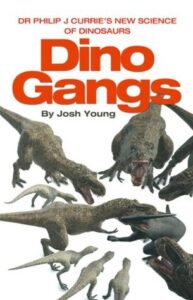 Dino Gangs, Josh Young
Dino Gangs, Josh Young
Based on the work of Philip J. Currie, the man who helped to found the Royal Tyrrell Museum in Drumheller (a very worthwhile visit if you find yourself in Alberta), this book goes into various aspects of dinosaur life, mostly focusing on the tyrannosaurid Tarbosaurus. The main theme is Currie’s theory that they hunted as a pack, based on several lines of evidence such as finding articulated skeletons apparently buried at the same time, the high proportion of predators in the landscape, etc.
Unfortunately, there are two problems with this book. One is the repetition. The other is the fact that evidence contradicting Currie’s theories is presented several times, and then ignored — like the fact that the bonebeds might show a high proportion of Tarbosaurus, but their trackways comprise only 5% of the estimated population. And the fact that Komodo dragons devour their prey whole, which would lead to deposition of more predator remains than prey, even though prey are actually more abundant. Or the fact that the geologists aren’t at all sure the bodies were deposited at the same time.
I have no problem with the idea of dinosaurs as pack animals, but there seem to be some serious objections to Currie’s reasoning, which this book rather skims past as if they don’t matter. The way Young portrays Currie, it’s as though he pounces on things that confirm his ideas, and dismisses other things because they don’t fit with his ideas — the marks of a terrible scientist. Currie is widely respected, so that may well not be true, but that was definitely the impression I got here.
There are interesting more general bits of info about palaeontology, other aspects of Tarbosaurus, the realities of fieldwork… but mostly I’d stick with The Tyrannosaur Chronicles for something that feels a bit more solid.

GRRRRRRRRR! This sort of thing irritates me no end! It’s frustratingly widespread in pop sci writing.
Books seem to do that all the time…highlight the evidence that agrees with a theory yet ignore anything that may contradict. It can be pretty frustrating.
It’s actually a breach of scientific ethics and I condemn it outright.